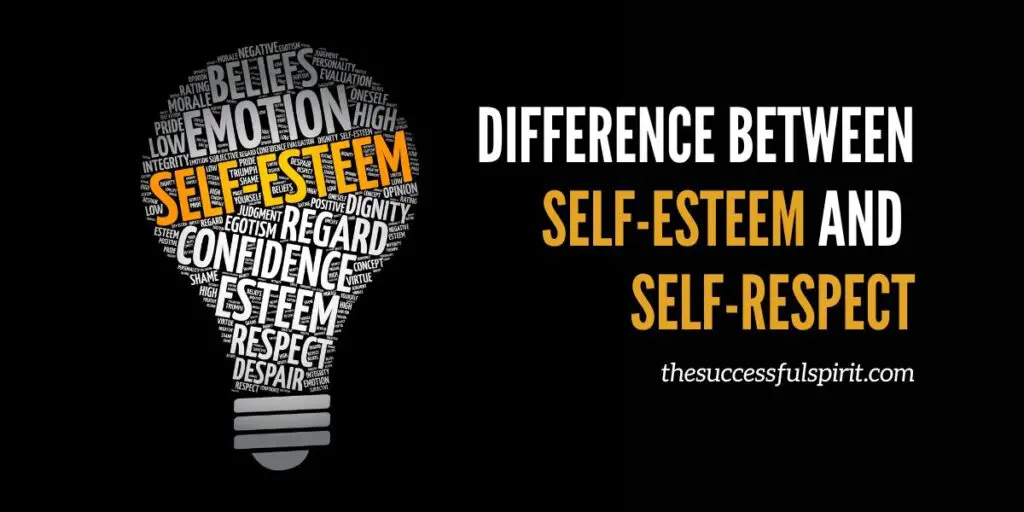Understanding the Difference Between Self-Esteem and Self-Respect
Do you know the difference between self-esteem and self-respect? Discover the key distinctions between these two concepts and how they impact our lives.
Self-esteem and self-respect are two terms that are often used interchangeably but have different meanings. While they both relate to how we feel about ourselves, they have distinct characteristics that set them apart.
Understanding the difference between self-esteem and self-respect is crucial in building healthy relationships, achieving personal growth, and living a fulfilling life. In this article, we will explore what self-esteem and self-respect mean, how they differ, and why they are important.

What is the difference between self-esteem and self-respect?
Self-esteem refers to the subjective evaluation of one’s worth, value, and competence. It is how we perceive ourselves and our abilities. Self-esteem can be influenced by internal and external factors such as achievements, feedback, and social comparison. It is often associated with a positive view of oneself and the confidence to take on new challenges.
Self-respect, on the other hand, refers to the level of regard and value we have for ourselves as individuals. It is the foundation of our self-worth and the belief that we deserve to be treated with dignity and respect. Self-respect is not dependent on external validation or accomplishments. It is an internal sense of worthiness that guides our actions and decisions.
The Meaning of Self-Esteem and Its Importance
Self-esteem refers to our overall evaluation of ourselves. It encompasses our beliefs, thoughts, and feelings about our worth and value as individuals. Healthy self-esteem is crucial for our emotional well-being, as it affects how we view ourselves and our abilities.
What is Self-Esteem?
Self-esteem is the level of confidence and satisfaction that a person has about their abilities, qualities, and worth as a person. It is the overall opinion that we have about ourselves, and it affects how we view ourselves in relation to others and the world around us.
The Importance of Healthy Self-Esteem
Having healthy self-esteem is important for our mental and emotional well-being. It helps us to feel confident, assertive, and capable of achieving our goals. On the other hand, low self-esteem can lead to feelings of inadequacy, self-doubt, and low confidence.
Factors That Influence Self-Esteem
Our self-esteem can be influenced by various factors such as our upbringing, life experiences, relationships, and societal pressures. For instance, if we were constantly criticized or belittled during childhood, we may develop low self-esteem.
Similarly, if we are surrounded by negative people or are constantly comparing ourselves to others, our self-esteem may suffer.
Signs of Low Self-Esteem
Some common signs of low self-esteem include negative self-talk, feelings of insecurity, avoiding new challenges or opportunities, and seeking validation from others.
Overcoming Low Self-Esteem
Overcoming low self-esteem requires a commitment to self-improvement. This may involve changing negative self-talk, developing positive affirmations, setting achievable goals, and seeking support from loved ones or a therapist.
Understanding Self-Respect and Its Significance
Self-respect, on the other hand, is more focused on how we treat ourselves. It is the recognition and appreciation of our own worth, and the belief that we deserve to be treated with dignity and respect. Self-respect is important because it shapes our behaviors and how we allow others to treat us.
Defining Self-Respect
Self-respect is the value that we place on ourselves and our worth as individuals. It is the belief that we deserve to be treated with dignity and respect and that our opinions and feelings matter.
The Significance of Self-Respect
Having self-respect is crucial for building healthy relationships, making good decisions, and leading a fulfilling life. It allows us to set boundaries, say “no” when necessary, and prioritize our own needs and values.
The Role of Self-Respect in Healthy Relationships
Self-respect plays a critical role in building and maintaining healthy relationships. When we have a strong sense of self-respect, we are less likely to tolerate abusive or disrespectful behavior from others. We are also more likely to attract and maintain healthy relationships based on mutual respect and understanding.
Signs of Low Self-Respect
Some common signs of low self-respect include accepting mistreatment from others, tolerating disrespectful behavior, neglecting our own needs and desires, and feeling guilty or ashamed for expressing our opinions or feelings.
Cultivating Self-Respect
Cultivating self-respect requires a commitment to our own well-being and self-care. This may involve setting boundaries, practicing self-compassion, and standing up for ourselves when necessary.
The Key Differences Between Self-Esteem and Self-Respect
While self-esteem and self-respect are related, they are not the same thing. Self-esteem is more focused on our internal evaluation of ourselves, while self-respect is more focused on our external behaviors and how we treat ourselves.
Self-esteem can be influenced by factors such as success, achievement, and validation from others, while self-respect is based more on our own personal values and beliefs.
Differentiating Self-Esteem and Self-Respect
While self-esteem and self-respect are often used interchangeably, they are distinct concepts. Self-esteem is more focused on our beliefs about our abilities and qualities, while self-respect is more focused on our sense of self-worth and dignity.
Why Self-Esteem Alone is Not Enough
Having high self-esteem alone is not enough to lead a fulfilling life. We also need to have a strong sense of self-respect, which involves valuing ourselves as individuals and prioritizing our own well-being.
The Relationship Between Self-Esteem and Self-Respect
While self-esteem and self-respect are distinct concepts, they are closely related. Having healthy self-esteem can help us to develop self-respect while having self-respect can enhance our self-esteem.
The Impact of Self-Esteem and Self-Respect on Our Lives
Both self-esteem and self-respect play crucial roles in shaping our lives. When we have healthy levels of self-esteem, we are more
able to pursue our goals with greater determination. On the other hand, when we lack self-esteem, we may struggle with self-doubt, insecurity, and low confidence, which can hold us back from achieving our full potential.
Similarly, self-respect is essential for building healthy relationships with others. When we have self-respect, we set boundaries and communicate our needs effectively, which can lead to stronger and more meaningful connections with others.
Conversely, when we lack self-respect, we may tolerate mistreatment from others or engage in self-destructive behaviors.
The Impact of Low Self-Esteem on Our Lives
Low self-esteem can lead to negative self-talk, feelings of inadequacy, and a lack of confidence. This can make it difficult to pursue goals, take risks, and assert ourselves in social situations. People with low self-esteem may also be more likely to engage in self-destructive behaviors like substance abuse, eating disorders, or self-harm.
The Impact of Low Self-Respect on Our Lives
Low self-respect, on the other hand, can manifest as a lack of boundaries, self-care, and self-compassion. People with low self-respect may put up with mistreatment from others, neglect their own needs, or struggle with feelings of shame and self-blame.
The Benefits of Healthy Self-Esteem and Self-Respect
In contrast, healthy self-esteem and self-respect can have many benefits. People with healthy self-esteem are more likely to have positive relationships, set and achieve goals, and cope with setbacks and challenges. They may also be more resilient in the face of stress and adversity.
How Self-Esteem and Self-Respect Affect Our Decisions and Choices
When we have healthy self-esteem and self-respect, we are more likely to make decisions and choices that align with our values and priorities. We are better able to communicate our needs and desires to others, negotiate conflicts, and advocate for ourselves in various settings. This can lead to greater satisfaction in our relationships and overall life.
The Connection Between Self-Esteem, Self-Respect, and Mental Health
There is also a strong connection between self-esteem, self-respect, and mental health. People with low self-esteem and self-respect are more likely to experience depression, anxiety, and other mental health issues. In contrast, cultivating healthy self-esteem and self-respect can be protective against mental health problems and promote overall well-being.
Ways to Build and Maintain Healthy Self-Esteem and Self-Respect
While self-esteem and self-respect are important, they are not fixed traits that we are born with. Instead, they are skills that we can develop and cultivate over time. Here are some strategies to help build and maintain healthy levels of self-esteem and self-respect:
Tips for Building and Maintaining Healthy Self-Esteem
- Practice self-care: Take care of your physical and emotional needs by getting enough sleep, eating well, and engaging in activities that bring you joy and fulfillment.
- Challenge negative self-talk: Pay attention to the negative thoughts you have about yourself and replace them with more positive and affirming ones.
- Set achievable goals: Break down larger goals into smaller, more achievable ones and celebrate your successes along the way.
- Surround yourself with positive influences: Seek out relationships with people who uplift and support you, rather than bring you down.
- Focus on your strengths: Recognize and appreciate your unique qualities and talents, and find ways to use them in your daily life.
Strategies for Cultivating Self-Respect
- Set boundaries: Identify your limits and communicate them to others in a clear and assertive manner.
- Practice self-compassion: Treat yourself with the same kindness and understanding you would offer to a close friend.
- Take responsibility for your actions: Hold yourself accountable for your choices and decisions, and learn from your mistakes.
- Practice honesty and integrity: Be true to your values and beliefs, even in difficult situations.
- Build a support system: Seek relationships with people who respect and value you for who you are.
The Importance of Self-Care in Nurturing Self-Esteem and Self-Respect
Self-care is an important aspect of nurturing both self-esteem and self-respect. Taking the time to care for our physical and emotional well-being can help us feel more confident, resilient, and capable. Self-care can take many forms, such as:
- Exercise
- Meditation or mindfulness practices
- Creative activities, such as painting or writing
- Spending time in nature
- Engaging in hobbies or interests that bring us joy
Seeking Support When Needed
Building and maintaining healthy levels of self-esteem and self-respect can be challenging, especially if we have experienced significant trauma or difficult life circumstances. In these situations, it can be helpful to seek support from a trusted friend, family member, or mental health professional.
Celebrating Your Successes and Accomplishments
Finally, it’s important to celebrate our successes and accomplishments along the way. Recognizing our achievements can help boost our self-esteem and reinforce our sense of self-respect.
This can be as simple as acknowledging a job well done or treating ourselves to a special reward. By taking the time to celebrate our successes, we can build the confidence and resilience needed to overcome challenges and pursue our goals with greater determination.
FAQs:
Can someone have high self-esteem but low self-respect?
Yes, it is possible for someone to have a positive view of themselves and their abilities but still lack a strong sense of self-worth and respect. This can lead to unhealthy relationships and a lack of fulfillment in life.
Can self-esteem and self-respect be developed later in life?
Yes, both self-esteem and self-respect can be developed and strengthened throughout life. It may require conscious effort and practice, but it is never too late to work on improving how you feel about yourself and your worth as an individual.
How can I cultivate self-respect?
Cultivating self-respect involves setting and maintaining healthy boundaries, speaking up for yourself, and prioritizing your needs and values. It also involves treating yourself with kindness and compassion, and recognizing that you deserve to be treated with respect and dignity.
Conclusion
In conclusion, self-esteem and self-respect are two distinct but interrelated concepts that are important for our overall well-being. While self-esteem refers to how we perceive ourselves and our abilities, self-respect is the foundation of our self-worth and the belief that we deserve to be treated with dignity and respect.
Understanding the difference between these two concepts is crucial in building healthy relationships, making fulfilling life choices, and achieving personal growth. By building and maintaining healthy levels of both self-esteem and self-respect, we can live a more fulfilling and satisfying life.







